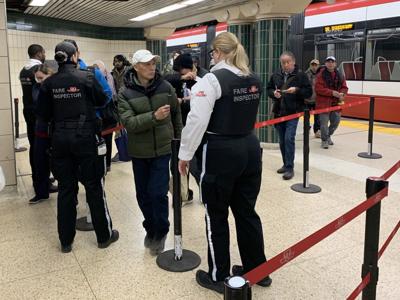From Sunday onwards, TTC fare inspectors have been rebranded as Provincial Offences Officers, a change the commission hopes will help crack down on fare theft.
The new designation will help reflect the officers’ roles in enforcing fare compliance, education and providing customer care, .
It’s already led to raised eyebrows on social media — and not because of the officers’ diligent fare enforcement.
With TTC fare evasion now costing an estimated $140 million a year, the time seems right for a new enforcement system.
With TTC fare evasion now costing an estimated $140 million a year, the time seems right for a new enforcement system.
“Just spotted some POO’s on the street. (Did ANYONE workshop this?),” a photo of the officers in their new uniforms.
“We’re going to have to do some work on the acronym,” ÎÚÑ»´«Ã½ City Councillor Josh Matlow .
But according to the TTC, the POO is out of its hands.Â
“The Provincial Offences Officer designation is not ours to begin with,” TTC spokesperson Stuart Green said in an email, explaining the title applies to anyone in Ontario who enforces bylaws.
“We thank the snickering, puerile 12-year-old boys who dominate the internet for their deep insights,” he said. “However, it does not negate the fact that fare cheats face fines of hundreds of dollars — which is no laughing matter.”
What are Provincial Offences Officers anyway?
According to the TTC, the POOs will continue to request proof of payment from TTC riders, and may issue tickets to customers who didn’t pay. These tickets can range from $235 to $425.
The rebrand also came with new uniforms: a grey shirt and a vest emblazoned with the new designation.
Two hours. Six stops. Lots of snacks. How to make the most of a two-hour Presto fare window.
Two hours. Six stops. Lots of snacks. How to make the most of a two-hour Presto fare window.
The TTC said the change follows a 2019 ÎÚÑ»´«Ã½ Auditor General’s report that found a greater inspection presence could improve fare compliance.
It’s the latest step the TTC has taken to recoup lost revenue, according to the news release. The commission loses as much as $140 million to fare evasion every year, according to the 2023 TTC audit — “money that could go into better service, enhanced safety and other improvements to the customer experience,” Green said.
To nail down fare evaders, the commission has also begun phasing out “no-tap” fare gates at subway stations, introducing plain clothes fare inspectors and are planning to hire more fare inspectors and introduce body cameras and mobile ticketing, it said in the release.Â
Where did the title “Provincial Offences Officer” come from?
The designation of Provincial Offences Officer is enshrined in Ontario’s .
The act defines POOs as “an officer, employee or agent of any municipality or of any local board of any municipality whose responsibilities include the enforcement of a bylaw, an Act or a regulation under an Act, while in the discharge of his or her duties.”
Police officers also fall under the POO designation, according to the act.
The TTC isn’t the first to use the POO title. Mentions of POOs pop up in archived ÎÚÑ»´«Ã½ Star  — with responsibilities ranging from testing landfills for illegal industrial waste to ticketing fare evaders on GO trains.
“The TTC receives a significant City of ÎÚÑ»´«Ã½ operating subsidy but also relies heavily on fares to support its operations,” TTC CEO Mandeep S. Lali said in the release. “We remind customers that when they choose not to pay their fare, it impacts our ability to increase service and keep fare prices low.”





























To join the conversation set a first and last name in your user profile.
Sign in or register for free to join the Conversation